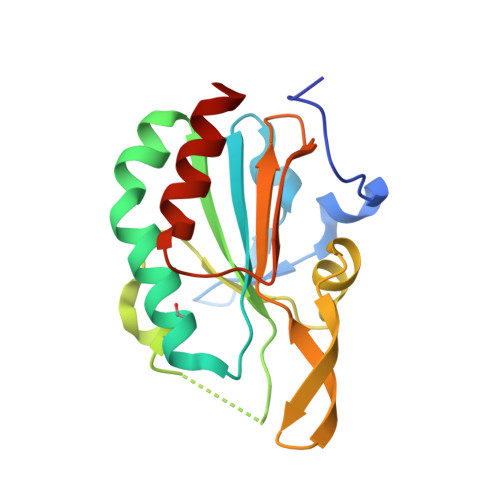Insights into the alkyl peroxide reduction pathway of Xanthomonas campestris bacterioferritin comigratory protein from the trapped intermediate-ligand complex structures
Liao, S.-J., Yang, C.-Y., Chin, K.-H., Wang, A.H.-J., Chou, S.-H.(2009) J Mol Biol 390: 951-966
- PubMed: 19477183
- DOI: https://doi.org/10.1016/j.jmb.2009.05.030
- Primary Citation of Related Structures:
3GKK, 3GKM, 3GKN - PubMed Abstract:
Considerable insights into the oxidoreduction activity of the Xanthomonas campestris bacterioferritin comigratory protein (XcBCP) have been obtained from trapped intermediate/ligand complex structures determined by X-ray crystallography. Multiple sequence alignment and enzyme assay indicate that XcBCP belongs to a subfamily of atypical 2-Cys peroxiredoxins (Prxs), containing a strictly conserved peroxidatic cysteine (C(P)48) and an unconserved resolving cysteine (C(R)84). Crystals at different states, i.e. Free_SH state, Intra_SS state, and Inter_SS state, were obtained by screening the XcBCP proteins from a double C48S/C84S mutant, a wild type, and a C48A mutant, respectively. A formate or an alkyl analog with two water molecules that mimic an alkyl peroxide substrate was found close to the active site of the Free_SH or Inter_SS state, respectively. Their global structures were found to contain a novel substrate-binding pocket capable of accommodating an alkyl chain of no less than 16 carbons. In addition, in the Intra_SS or Inter_SS state, substantial local unfolding or complete unfolding of the C(R)-helix was detected, with the C(P)-helix remaining essentially unchanged. This is in contrast to the earlier observation that the C(P)-helix exhibits local unfolding during disulfide bond formation in typical 2-Cys Prxs. These rich experimental data have enabled us to propose a pathway by which XcBCP carries out its oxidoreduction activity through the alternate opening and closing of the substrate entry channel and the disulfide-bond pocket.
Organizational Affiliation:
Institute of Biochemistry, National Chung-Hsing University, Taichung, Taiwan, ROC.















